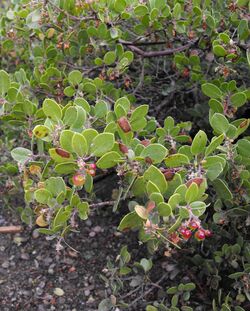Biology:Arctostaphylos rudis
| Arctostaphylos rudis | |
|---|---|

| |
| Scientific classification | |
| Kingdom: | Plantae |
| Clade: | Tracheophytes |
| Clade: | Angiosperms |
| Clade: | Eudicots |
| Clade: | Asterids |
| Order: | Ericales |
| Family: | Ericaceae |
| Genus: | Arctostaphylos |
| Species: | A. rudis
|
| Binomial name | |
| Arctostaphylos rudis Jeps. & Wies. ex Jeps.
| |
Arctostaphylos rudis, with the common names Shagbark manzanita and Sand mesa manzanita, is a species of manzanita.
Description
This is an erect shrub growing from a burl to heights between one and two meters - 3 and 6 feet. Its stem and branches are covered in shredding gray and reddish bark, with its smaller branches coated in woolly fibers. The leaves are oval in shape and smooth along the edges with few hairs, green in color and shiny. They are 1 to 3 centimeters long. It flowers in late fall and winter in urn-shaped manzanita flowers. The fruits are hairless red drupes about a centimeter wide or slightly larger.
Distribution
Arctostaphylos rudis is endemic to California , where it is known only from the southern Central Coast. It is most abundant at Burton Mesa in the hills north of Lompoc, and there are a few occurrences remaining near Nipomo. It grows in chaparral and coastal sage scrub on sandy soils.
See also
- California chaparral and woodlands
- California coastal sage and chaparral ecoregion
References
External links
- Jepson Manual Treatment of Arctostaphylos rudis
- USDA Plants Profile for Arctostaphylos rudis
- Arctostaphylos rudis — CalPhoto gallery
- Oregon State University—Landscape Plants
Wikidata ☰ Q4787701 entry
 |


